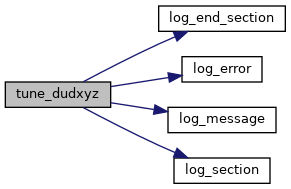Loading...
Searching...
No Matches
#include <string.h>#include <stdlib.h>#include <stdio.h>#include <hip/hip_runtime.h>#include <device/device_config.h>#include <device/hip/check.h>#include "dudxyz_kernel.h"#include <common/neko_log.h>Go to the source code of this file.
Macros | |
| #define | CASE_1D(LX) |
| #define | CASE_KSTEP(LX) |
| #define | CASE(LX) |
| #define | CASE_LARGE(LX) |
Functions | |
| template<const int > | |
| int | tune_dudxyz (void *du, void *u, void *dr, void *ds, void *dt, void *dx, void *dy, void *dz, void *jacinv, int *nel, int *lx) |
| void | hip_dudxyz (void *du, void *u, void *dr, void *ds, void *dt, void *dx, void *dy, void *dz, void *jacinv, int *nel, int *lx) |
Macro Definition Documentation
◆ CASE
Value:
jacinv, nel, lx); \
CASE_KSTEP(LX); \
} \
break
__global__ void T *__restrict__ T *__restrict__ const T *__restrict__ u
Definition ax_helm_full_kernel.h:46
__global__ void T *__restrict__ T *__restrict__ const T *__restrict__ const T *__restrict__ const T *__restrict__ const T *__restrict__ dx
Definition ax_helm_full_kernel.h:49
__global__ void T *__restrict__ T *__restrict__ const T *__restrict__ const T *__restrict__ const T *__restrict__ const T *__restrict__ const T *__restrict__ const T *__restrict__ dz
Definition ax_helm_full_kernel.h:51
__global__ void T *__restrict__ T *__restrict__ const T *__restrict__ const T *__restrict__ const T *__restrict__ const T *__restrict__ const T *__restrict__ dy
Definition ax_helm_full_kernel.h:50
__global__ void T *__restrict__ T *__restrict__ const T *__restrict__ const T *__restrict__ const T *__restrict__ const T *__restrict__ const T *__restrict__ const T *__restrict__ const T *__restrict__ const T *__restrict__ const T *__restrict__ const T *__restrict__ const T *__restrict__ const T *__restrict__ const T *__restrict__ const T *__restrict__ const T *__restrict__ const T *__restrict__ const T *__restrict__ jacinv
Definition ax_helm_full_kernel.h:62
__global__ void const T *__restrict__ const T *__restrict__ const T *__restrict__ ds
Definition cdtp_kernel.h:108
__global__ void const T *__restrict__ const T *__restrict__ const T *__restrict__ const T *__restrict__ dt
Definition cdtp_kernel.h:109
__global__ void dirichlet_apply_scalar_kernel(const int *__restrict__ msk, T *__restrict__ x, const T g, const int m)
Definition dirichlet_kernel.h:42
◆ CASE_1D
Value:
◆ CASE_KSTEP
Value:
◆ CASE_LARGE
Function Documentation
◆ hip_dudxyz()
| void hip_dudxyz | ( | void * | du, |
| void * | u, | ||
| void * | dr, | ||
| void * | ds, | ||
| void * | dt, | ||
| void * | dx, | ||
| void * | dy, | ||
| void * | dz, | ||
| void * | jacinv, | ||
| int * | nel, | ||
| int * | lx | ||
| ) |
Fortran wrapper for device hip derivative kernels
Definition at line 58 of file opr_dudxyz.hip.
Here is the call graph for this function:

